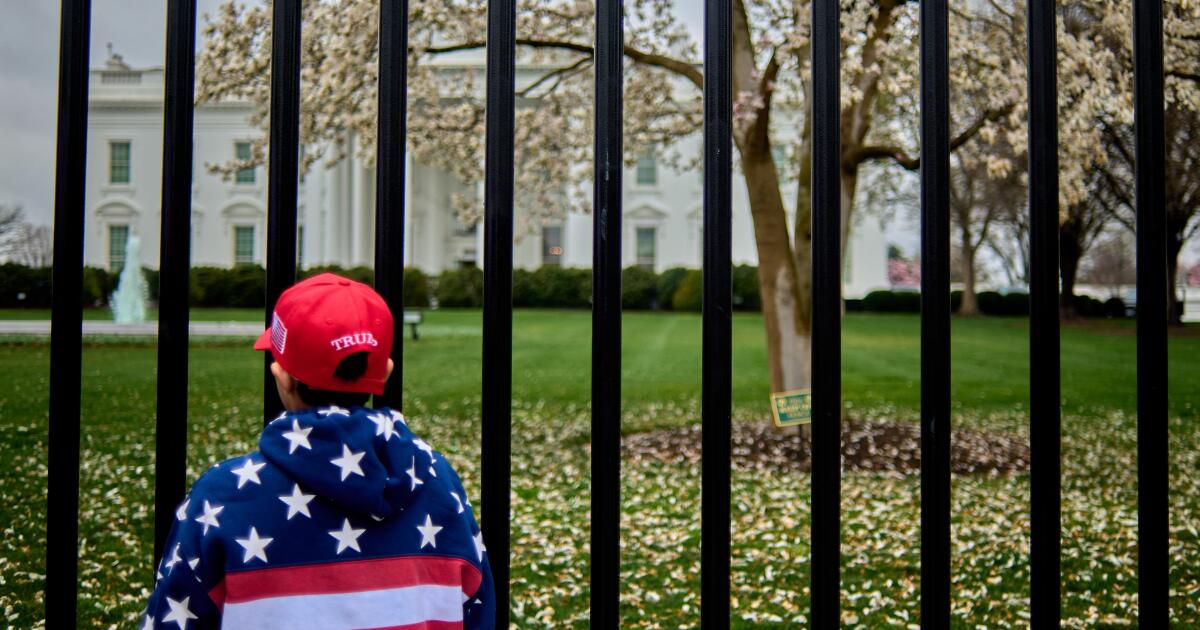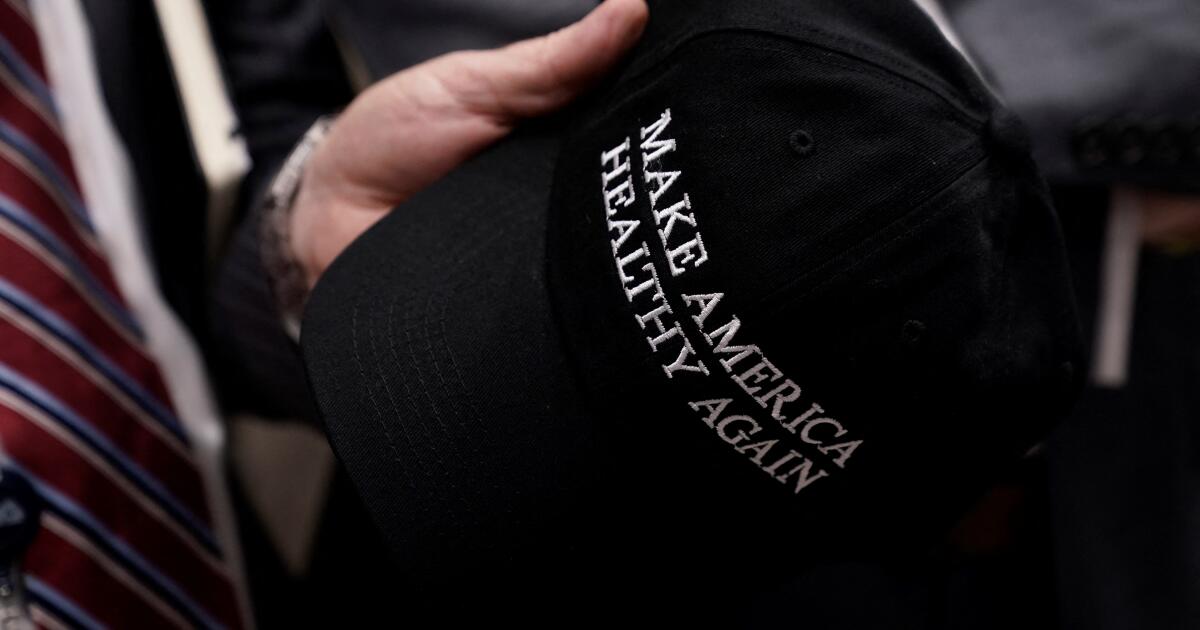Column: Why MAGA’s ideologues can’t always get what they want
MAGA has a problem, in the form of Donald Trump. Put simply: MAGA wants to define what MAGA (or “America first”) means, and Donald Trump wants it to mean whatever he says at any given moment.
I should offer a little definitional clarity and political nuance. Make America Great Again means different things to different people. The Trump coalition is not monolithic, it contains factions that do not necessarily consider themselves to be MAGA. But as shorthand, MAGA is an identifiably distinct bloc on the right, and it’s the dominant faction in the broader GOP coalition. Its internal diversity notwithstanding, it still has a worldview or ideology. And the MAGA faithful are increasingly frustrated by the fact that Trump doesn’t always share, or prioritize, that ideology.
They believed that if you could just “let Trump be Trump” he would follow their conception of MAGA. In Ronald Reagan’s first term, many movement conservatives were frustrated by what they perceived as the Gipper’s drift toward centrism. They blamed moderates in the administration. “Let Reagan be Reagan” became a rallying cry on the right.
“It’s a piece of conventional wisdom on the new American right that Donald Trump struggled in his first term because he hired the wrong people — old-think Bush Republicans, figures like Rex Tillerson and Steven Mnuchin, who didn’t have a populist bone in their bodies,” the news website Semafor’s Ben Smith offers in an astute analysis.
As a result, Smith continues, “Trump’s most passionate supporters weren’t going to make that mistake again. They created initiatives like American Moment, Project 2025, and others aimed at grooming and credentialing a cadre of MAGA appointees. When Trump took office, the America Firsters moved en masse into the Department of Defense. Big Tech avengers seized the antitrust apparatus. Conspiracy-minded podcasters took over the FBI.
“And yet — just as Trump often ignored his conventional advisers in the first term, he’s stunned loyalists by sweeping aside this carefully assembled apparat in 2025.”
Trump said as much to the Atlantic magazine last month: “I think I’m the one that decides” what “America first” means.
“It turns out that personnel isn’t policy,” the executive director of the American Conservative, Curt Mills, “glumly” told Smith. The idea that “personnel is policy” is another Reagan-era mantra; put Reaganites in important positions and you’ll get Reaganite policies. Putting Trumpists in powerful positions doesn’t yield the same results.
Immigration hawks have been panicking over the president’s suggestion that farm and hotel workers should be excluded from his deportation schemes. As Trump told Fox News, “I’m on both sides of the thing.” Foreign policy “restrainers” were beclowned by his support of Israel’s strikes on Iran and his apparent about-face on helping Ukraine.
On China, Trump’s been a hawk as promised, except when he hasn’t, allowing NVIDIA to sell chips to China, and ignoring the law by refusing to sell or shutter TikTok.
Then there’s the Jeffrey Epstein fiasco, which has bedeviled Trump for weeks. It’s intensity and durability can best be explained by the fact that it divides those who define Trumpism as loyalty to Trump and those who believe that loyalty would be, must be rewarded by a cleansing of corrupt globalist elite — or something.
In short, there is no “Trumpism” that is an analogue to Reaganism. Reaganism is a philosophical approach. What defines Trump’s reign is better understood as a psychological phenomenon both as an explanation of his behavior and of his fans’ cultish and performative loyalty. To the extent Trump has a philosophy it is to follow his instincts, which are most powerfully informed first by his own ego but also the dramaturgy of professional wrestling, reality TV and Norman Vincent Peale’s prosperity gospel.
He’s said many times that he considers unpredictability a virtue in itself, which by definition means he is going to disappoint anyone who expects philosophical coherence. When Trump was a bull in a China shop, the people most excited by the sound of breaking vases and dishware assumed there was a broader method to the madness. But now the same people are learning that Trump won’t be saddled by his fans any more than he is by norms.
This was always going to be the case (as I noted in 2017), but what adds to MAGA’s frustration is that anyone can see and copy the bull-handling techniques that are most likely to work. Compliment him, call him “daddy,” celebrate his genius and expertise, and you too can manipulate him with at least moderate success.
Perhaps most significant, it’s becoming clear that a movement defined by loyalty to a mercurial personality is bound to split apart once that personality leaves the stage — if not sooner.
Insights
L.A. Times Insights delivers AI-generated analysis on Voices content to offer all points of view. Insights does not appear on any news articles.
Viewpoint
Perspectives
The following AI-generated content is powered by Perplexity. The Los Angeles Times editorial staff does not create or edit the content.
Ideas expressed in the piece
-
The author contends that MAGA faces a fundamental problem with Donald Trump himself, as the movement seeks to define what “America First” means while Trump insists it means whatever he declares at any given moment. This creates an inherent tension between ideological consistency and Trump’s mercurial leadership style.
-
The piece argues that MAGA faithful have grown increasingly frustrated with Trump’s failure to consistently share or prioritize their worldview, despite their belief that allowing Trump to “be Trump” would naturally align with their conception of the movement. This frustration stems from Trump’s tendency to disappoint supporters across various policy areas including immigration, foreign policy, and China relations.
-
The author maintains that the Reagan-era principle of “personnel is policy” fails to apply to Trump, as placing committed Trumpists in powerful positions does not guarantee the implementation of coherent MAGA policies. Instead, Trump often ignores or sidelines his carefully selected advisers just as he did with conventional Republicans in his first term.
-
The analysis suggests that there is no coherent “Trumpism” philosophy comparable to Reaganism, describing Trump’s approach as fundamentally psychological rather than philosophical. The author characterizes Trump’s governing style as driven primarily by ego and influenced by professional wrestling, reality TV, and prosperity gospel theatrics.
-
The piece concludes that any movement defined by loyalty to a mercurial personality is destined to fracture once that personality exits the political stage, if not sooner, as Trump’s unpredictability prevents the philosophical coherence necessary for lasting political movements.
Different views on the topic
-
Contrary perspectives suggest that Trump has successfully consolidated control over the Republican Party, with his MAGA movement having effectively routed the GOP establishment and become the new institutional power structure[1]. This view emphasizes Trump’s political dominance rather than internal fractures or ideological inconsistencies.
-
Some observers argue that Trump’s influence within his own coalition remains strong, noting that his ability to intimidate reporters and maintain loyalty from supporters, social media influencers, and Fox News hosts demonstrates continued political power[2]. This perspective suggests that apparent divisions may be temporary rather than signs of fundamental weakness.
-
Alternative viewpoints acknowledge tensions within the MAGA coalition but frame them as natural political evolution rather than fatal flaws, suggesting that political movements often experience internal debates and realignments without necessarily fracturing[1]. These perspectives emphasize Trump’s track record of successfully navigating previous challenges to his leadership.

